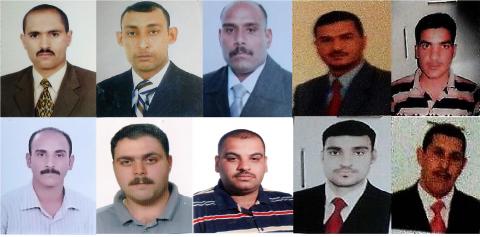
(Geneva, August 3, 2018) – The United Nations Working Group on Arbitrary Detention (WGAD ) has published a decision adopted in April 2018 and issued in late July qualifying the detention of 24 Iraqi citizens* as arbitrary. The majority of individuals named in Opinion 38/2018 were employees or persons with alleged personal connections with former Vice-President Tariq Al Hashimi.
This decision supplements a previous Opinion adopted by the WGAD in April 2017, which concluded that 19 other staff members had been victims of “collective punishment” and “guilt by association”. In the newly-adopted decision, the WGAD called for the immediate release of the 24 individuals, a number of whom are currently on death row.
Background
Tariq Al Hashimi served as vice-president of Iraq, and had become one of the key figures in the opposition to former Prime Minister Nouri Al Maliki, who was criticised because of his sectarian policies and his concentration of power.
On December 20, 2011, and in the context of the U.S withdrawal, Iraqi officials issued an arrest warrant for Al Hashimi over suspected links to terrorism based on confessions the government said it obtained from his bodyguards.
Concerned over his safety, Al Hashimi had fled to the Kurdish autonomous region on December 18, 2011 before seeking refuge in Turkey, where he currently resides. While in exile, he publicly resigned from the vice-presidency on December 30, 2013. The members of his staff who remained in the country, including his secretary Rasha Al Husseini and bodyguards, were found guilty by association and arrested.
“A miscarriage of justice”
Arrested by Iraqi security forces between November 2011 and May 2013, all 24 individuals on behalf of whom Alkarama sent a communication to the WGAD in January 2018 have been accused of acts of terrorism. They have all been sentenced by the Central Criminal Court of Iraq (CCCI) – a court which does not meet international standards of due process – to penalties ranging from 15 years of imprisonment to capital punishment under the repressive and broad Anti-Terrorism Law No. 13 of 2005.
Noting the Iraqi authorities’ refusal to provide information about the situation of the 24 detainees, the experts found numerous violations of international human rights law, including the International Covenant on Civil and Political Rights (ICCPR) – which Iraq ratified in 1971.
Following the arrests – which were conducted outside of any legal framework – they were all taken to secret locations for the purpose of interrogation and prevented from contacting their families and lawyers for several months. The WGAD thus found that the arrest and prolonged incommunicado detention in a secret location lacked any legal basis, in violation of articles 9 and 14 of the ICCPR.
Moreover, at no time during the procedure did the Iraqi authorities respect fair trial guarantees. The WGAD found that that “none of the 24 individuals were promptly brought before a judge but instead held incommunicado […] outside the protection of the law”.
While secretly detained, they were exposed to severe acts of torture – including beatings, electrocution, and waterboarding – with the primary objective of obtaining incriminating confessions, which were later used in court as the sole source of evidence.The WGAD recalled that “the use of confessions extracted under torture is prohibited”, adding that “death sentences passed against 14 of the 24 individuals, based on confessions extracted under torture are in particular miscarriage of procedural justice, including their right to a fair trial”.
The UN experts finally stressed that the victims’ detention constituted a form of discrimination as they were all targeted because they were perceived as close to Al Hashimi. While most of the arrestees worked for the former vice-president, some were targeted merely for being relatives of his employees or for having had their names cited in confessions extracted under torture.
In that regard, the Working Group found that it was very difficult for the Working Group “not to conclude that they have been caught up in apparently neutral but actually discriminatory wheels of justice”.
In light of the above, Alkarama reiterates its calls to the Iraqi authorities to uphold their international obligations by implementing both WGAD Opinions that recognise the arbitrary character of the 43 individuals accused of real or perceived ties with Tariq Al Hashimi. The authorities must therefore release the 42 individuals who remain in detention, some of whom remain on death row. To date, only Rasha Al Husseini has been released after the Central Criminal Court in Baghdad decided to drop the charges held against her in October 2017.
*The names of the 24 individuals are as follows:
- Mohammed Hamid Ali Abdullah Al Jabouri
- Mohammed Nehme Abbas Mahmoud Al Jabouri
- Ahmad Ali Najim Rsan Al Abadi
- Omar Ali Najim Rsan Al Abadi
- Uday Hafiz Abbas Ali Al Ali
- Ali Adel AbdelKarim Ismail Al Hashemi
- Mazen Ahmad Sattar Hasan Al Obaidi
- Riad Abdullah Razik
- Mohammad Shawki Saoud Rahim Al Kubaisi
- Buraq Abdel Ilah Jassim Mohamad Al Habsh
- Qusay Saeed Abed Abbas Al Mashhadani
- Malik Abed Sultan Hamad
- Mohammad Firas Bahr Shati
- Hammad Zaidan Khalaf Al Fahdawi
- Abdul Razak Abdul Rahman Hasan Al Dulaimi
- Rafid Walid Rachid Majid Al Obaidi
- Hicham Ali Nayef Shatr
- Mustafa Mohammad AbdelKarim Salih Al Samurai Al Hasani
- Ismail Nasif Jassim Al Mashhadani
- Ali Moussa Hussein Al Ameri
- Salam Ashour Khalil Ibrahim Al Jumaili
- Qusay Obaid Ibrahim Salloum
- Loay Obaid Ibrahim Salloum
- Saad Alwan Hamadi Yassin Al Mashhadani
For more information or an interview, please contact media@alkarama.org (Dir: +41 22 734 1008).
